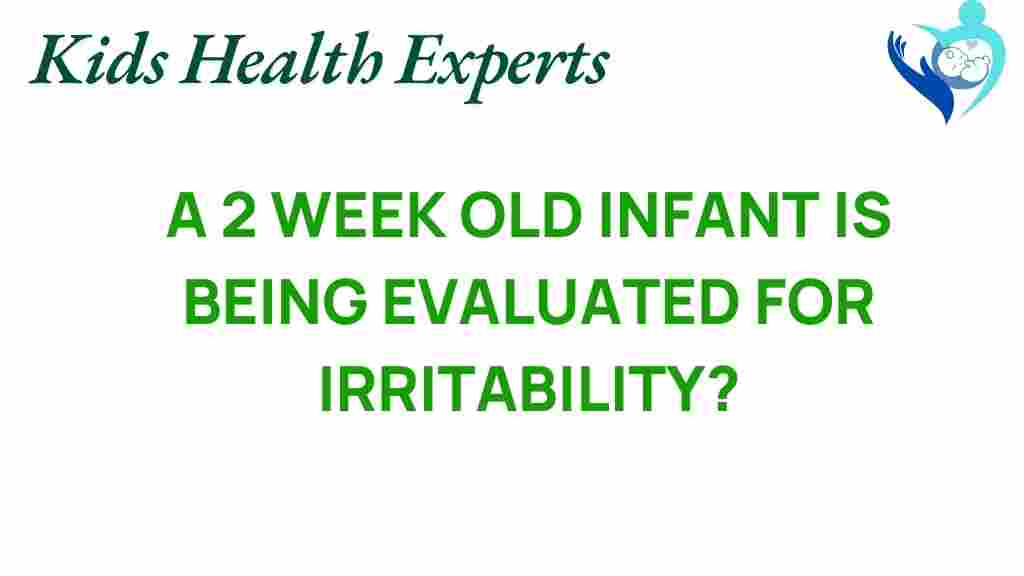Unraveling the Mystery: What Causes Infant Irritability?
Welcoming a newborn into the family can be a joyous yet challenging experience for new parents. Among the many surprises, one common concern that arises is infant irritability. Understanding this behavior in a 2-week-old infant is crucial for ensuring their well-being and facilitating a smooth transition for both the baby and the parents. This article will delve deep into the reasons behind irritability in newborns, what parents can do, and when to seek pediatric care.
Understanding Infant Behavior
Newborns communicate primarily through crying, and it is their primary means of expressing discomfort, hunger, or the need for attention. However, persistent crying can be perplexing and may indicate underlying issues. Parents should be aware of the typical patterns of infant behavior and what constitutes normal versus concerning signs.
Common Causes of Irritability in Newborns
Infant irritability can arise from various factors. Here are some common causes:
- Hunger: Infants have small stomachs and need to be fed frequently.
- Discomfort: This can stem from a wet diaper, tight clothing, or being too hot or cold.
- Fatigue: Overstimulation or lack of sleep can lead to irritability.
- Gas or Colic: Digestive issues can cause significant discomfort, leading to crying episodes.
- Illness: Any signs of illness, such as fever or unusual lethargy, should be evaluated.
Recognizing Early Signs of Infant Irritability
Being attentive to early signs of irritability can help parents address their newborn’s needs before they escalate into prolonged crying episodes. Here are some early signs to look out for:
- Fidgeting or squirming in their sleep.
- Making sucking motions or smacking their lips.
- Turning their head away from stimulation.
- Clenching their fists or arching their back.
Health Evaluation: When to Seek Help
If a baby’s irritability is excessive or accompanied by other concerning symptoms, it is essential to consult a pediatrician. Signs that warrant a health evaluation include:
- Persistent crying that lasts more than three hours a day.
- High-pitched crying or unusual sounds.
- Changes in feeding patterns or refusal to eat.
- Fever or other signs of illness.
Step-by-Step Process to Soothe an Irritable Infant
If you find yourself with a crying baby, here are some steps to help soothe them:
- Check for Basic Needs: Ensure the baby is fed, has a clean diaper, and is comfortable.
- Swaddle the Baby: Swaddling can provide a sense of security and comfort.
- Use Gentle Sounds: Soft background noise or white noise can be calming.
- Engage in Gentle Motions: Rocking, swinging, or gentle bouncing can help soothe the infant.
- Offer a Pacifier: Sucking can be a natural comfort for many infants.
Parental Guidance for Newborn Health
New parents often seek parental guidance to navigate the complexities of newborn care. Here are some tips to support your baby’s health:
- Establish a Routine: Consistency helps infants feel secure.
- Monitor Development: Keep track of developmental milestones and discuss any concerns with your pediatrician.
- Prioritize Your Well-Being: Caring for a newborn can be exhausting; take breaks and seek support when needed.
- Educate Yourself: Read up on infant care and behaviors to better understand your baby’s needs.
Troubleshooting Tips for Common Issues
Here are some troubleshooting tips to address specific issues that can lead to infant irritability:
- Gas Relief: Try gentle tummy massages or bicycle legs to alleviate gas discomfort.
- Overstimulation: Create a calm environment by dimming the lights and reducing noise.
- Colic Remedies: Some parents find success with colic drops or probiotics, but consult your pediatrician first.
- Temperature Regulation: Keep the room comfortably cool and dress the baby in layers.
Conclusion: Supporting Infant Well-Being
Understanding the causes of infant irritability is essential for ensuring the health and happiness of your newborn. By recognizing early signs, addressing basic needs, and employing soothing techniques, parents can help mitigate discomfort and promote a sense of security for their little one. Remember, every infant is unique, and what works for one may not work for another. Always trust your instincts as a parent, and don’t hesitate to reach out for pediatric care when needed. For more information on newborn health and development, consider visiting this resource for guidance. Together, you can navigate the early days of parenthood with confidence, ensuring your baby’s well-being and a harmonious family life.
This article is in the category Conditions and created by KidsHealthExperts Team
